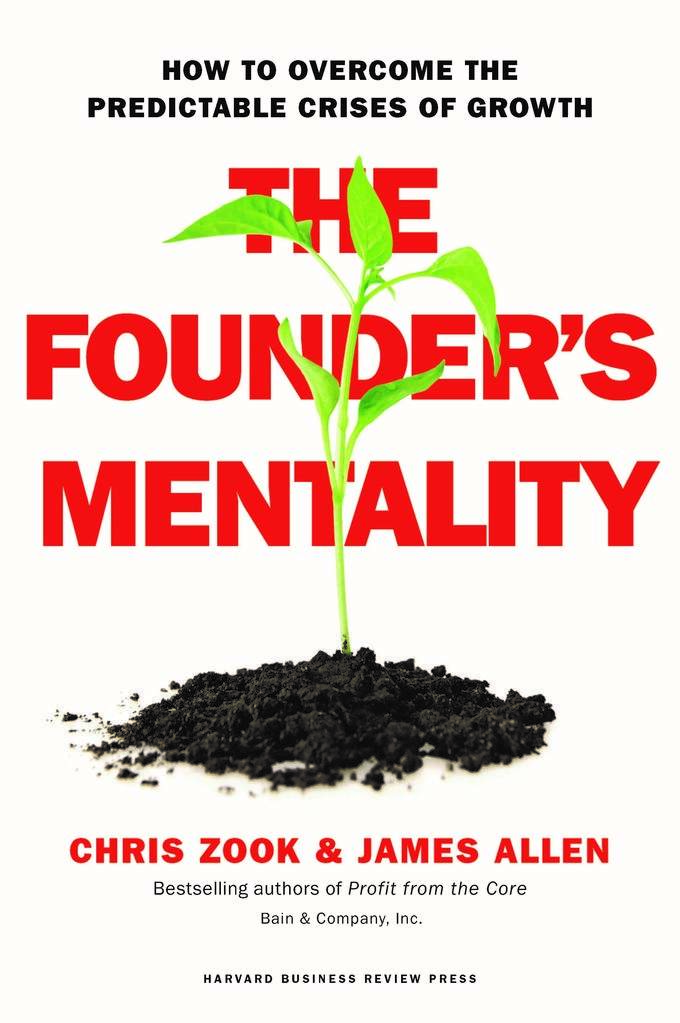 Leveraging a founder’s mentality can help organizations avoid internal issues and predictable crises that hinder lasting, profitable growth
Leveraging a founder’s mentality can help organizations avoid internal issues and predictable crises that hinder lasting, profitable growthMost successful companies eventually face a crisis with their growth, yet this rarely happens because of external factors beyond the company’s control. When Bain & Company’s Chris Zook and James Allen, co-authors of “Profit From the Core,” researched why growth is so difficult to achieve and sustain, they found 85 percent of executives point to internal rather than external barriers. As businesses become larger and more complex, they frequently lose touch with their customers. They are hampered by bureaucracy, and, as a result, are unable to act decisively and adapt quickly.
In their new book, “The Founder’s Mentality,” Zook and Allen show readers how to manage — and avoid — the predictable set of internal crises companies face as they grow. The key to sustainable growth and surviving internal obstacles lies in a company’s obsessive commitment to the front line and its customers, a pervasive owner’s mindset from the top down and a company’s “insurgent” mission “to wage war against its industry, or its standards, on behalf of customers whom it perceived as underserved, or not served at all.” Zook talks with
HOW DO YOU DEFINE THE FOUNDER’S MENTALITY?
The founder’s mentality came out of a five-year study in 40 countries. It’s a phrase we use to describe the behaviors, attitudes and practices that were common across the companies that had the most sustainable, high levels of performance over a long period. The companies where the founder was still the chief executive or deeply involved performed three times better than all other companies on shareholder returns did. The big difference was how these best performers were built on the inside. We called that the “founder’s mentality” because it was most powerfully embodied in the practices of the really great founders and also young, small companies that are growing. The three elements that make up the founder’s mentality are a deep sense of insurgency and understanding of what makes a company special, an obsession with what goes on at the ground level of the business, and an owner’s mindset and sense of personal responsibility. A company was five to seven times more likely to be a top performer if these elements were present.
WHAT ARE THE BIGGEST BENEFITS TO MAINTAINING A FOUNDER’S MENTALITY?
Every company wants to grow. Profitable growth creates returns for shareholders, opportunities for young workers to be promoted, increased market share and competitive relevance. But as companies become larger, they frequently collect complexity — complexity of layers and bureaucracy, complexity of products, complexity of decision-making. We found that overall complexity was the silent killer of profitable growth. When a company skews into bureaucracy, it tends to become slower, less innovative and less appealing. Companies start as insurgents at war against their industry or the norms of their industry, and as they get larger, they start to lose that vigorous component that made them successful in the first place.
HOW SHOULD A LEADER ALTER HIS OR HER STYLE TO SUCCEED?
There are many practices and activities leaders can undertake to reinforce the founder’s mentality:
• Emphasize what is special about the company. Only 13 percent of people feel they have any emotional connection to their business or know what makes it special, yet everybody wants to feel that connection.
• Get out to the front line. Leaders who stay behind their desks as their companies get bigger lose touch with the front line.
• Trust people at the front line and try to push decisions out with clear principles for how to make those decisions.
• Avoid or eliminate “energy vampires” who drain energy from the organization and hang from the rafters.
As a company grows, very often its corporate center takes on a life of its own. Make sure the doers receive accolades and power. In addition, to keep the founder’s mentality alive, break problems down into smaller pieces that can be solved in micro-battles and create founder opportunities within the company. Organizations accumulate barnacles. The work gets gummed up and the distortions of bureaucracy take over, but the founder’s mentality can help the engine burn faster, cleaner and hotter.
WHAT IS THE IMPACT OF THE FOUNDER’S MENTALITY ON DECISION-MAKING?
When we looked at companies such as DaVita Healthcare Partners, The
Companies that have renewed the founder’s mentality very often have a deeper sense of the principles by which people make decisions, more alignment on what makes the business special and more energy because energy vampires are pushed to the side. People who have an emotional connection to their business are more willing to invest their own time in innovative ideas and solving customer problems by a factor of five; so you end up with a company that actually makes decisions at a lower level more quickly and with more consistency. Renewal of the founder’s mentality actually makes everybody a mini-founder.
(This article has been contributed by YPO. This article first published in the November 2016 issues of YPO’s “Ignite” magazine)